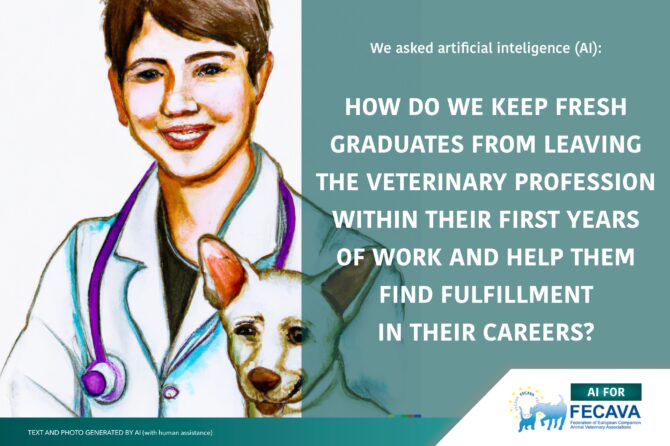
FECAVA asked AI: How do we keep fresh graduates from leaving the veterinary profession within their first years of work and help them find fulfillment in their careers?
Retaining fresh graduates in the veterinary profession and helping them find fulfillment in their careers is essential for the long-term success and growth of the profession. Here are some strategies that can be employed to achieve this:
- Mentorship Programs
Establish mentorship programs where experienced veterinarians guide and support new graduates. This can help bridge the gap between academic knowledge and practical skills while providing emotional support and guidance. - Continuing Education and Professional Development
Encourage and facilitate ongoing learning through workshops, conferences, and webinars. Provide opportunities for veterinarians to enhance their knowledge and skills in specialized areas, keeping them engaged and motivated. - Work-Life Balance
Promote a healthy work-life balance to prevent burnout and maintain overall well-being. Encourage regular breaks, vacations, and flexible work schedules whenever possible. - Competitive Compensation and Benefits
Ensure that fresh graduates are offered competitive salaries and benefits that align with industry standards. This can include healthcare benefits, retirement plans, and opportunities for professional growth. - Recognition and Reward
Recognize and reward the achievements and contributions of fresh graduates. This can be done through awards, incentives, or public acknowledgment, boosting their motivation and job satisfaction. - Supportive Work Environment
Foster a positive and supportive work environment that values teamwork, collaboration, and open communication. Encourage a culture where ideas are shared, and feedback is provided constructively. - Emotional Support and Mental Health Resources
Recognize the emotional challenges faced by fresh graduates and provide access to mental health resources such as counseling services or employee assistance programs. This can help them cope with the stress and emotional demands of the profession. - Collaboration and Networking
Facilitate opportunities for fresh graduates to collaborate and network with colleagues, both within their own practice and the broader veterinary community. Building professional relationships can provide a sense of belonging and facilitate knowledge sharing. - Variety and Specialization
Provide opportunities for fresh graduates to explore different areas of veterinary medicine and find their passion. Offer rotations or exposure to various specialties, allowing them to develop expertise and find fulfillment in their chosen field. - Feedback and Performance Evaluation
Regularly provide feedback on performance, acknowledging strengths and identifying areas for improvement. Constructive feedback can help fresh graduates grow and develop professionally.
By implementing these strategies, the veterinary profession can create a supportive and engaging environment for fresh graduates, increasing their job satisfaction and reducing the likelihood of them leaving the profession within the early years of their careers.
[text and picture generated by AI: ChatGPT and DALL-E]
Leave a reply

Nice post. I was checking constantly this blog and I’m impressed! Extremely useful info specially the last part I care for such information a lot. I was seeking this certain info for a long time. Thank you and good luck.
ReplyMentorship programs can provide new graduates with guidance and support from experienced veterinarians. This can be especially helpful in helping new graduates to navigate the challenges of their first job and to develop their skills and knowledge.
ReplyThis post is pure perfection.
ReplyFantastic post, however I was hoping you could write a bit more about it? I would much appreciate it if you could provide a little more detail. Regards ahead of time!
ReplyChan vay Linen la lua chon hoan hao cho mua he, mang den su thoai mai va phong cach thanh lich. De dang ket hop voi ao so mi hoac ao thun, giup ban luon noi bat va tu tin https://shopee.vn/vanhoang.clothing
Reply